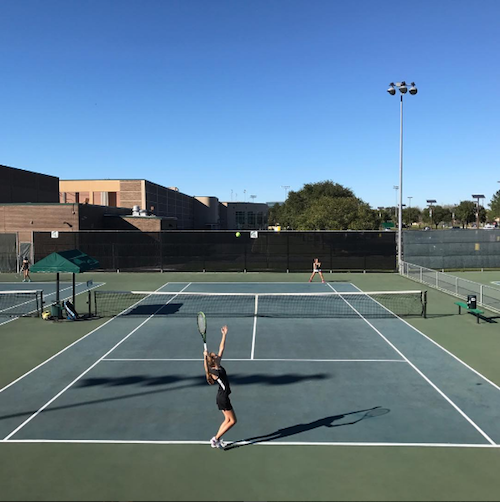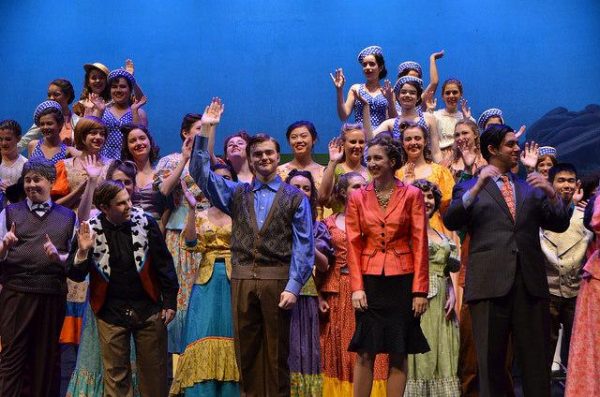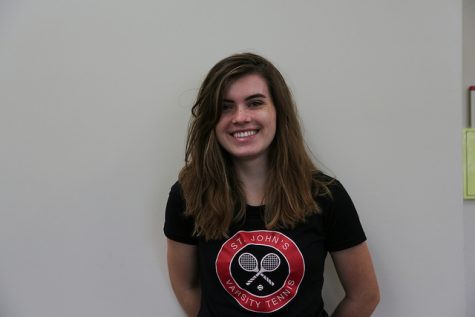Athletics, fine arts address tricky dilemma of making cuts

Girls’ tennis member Hannah Johnston plays singles against Stratford. Although boys’ tennis is making cuts, girls’ tennis has a total of 32 girls players on Varsity and JV, including one senior on JV.
May 9, 2017
Instead of placing all players on JV squads, Upper School boys’ tennis coaches have had to cut players from the program. In Middle School, tennis and golf teams have had to make cuts as well.
One of the students cut from boys’ tennis had previously been on the team and was surprised by the news. The coaches had not cut any team members the year before.
“They didn’t talk too much about skill, just that there’s way too many people on the team to take in more,” the cut team member said. “We don’t have enough courts to have everyone.”
When limited facilities do not allow for multiple teams, coaches are forced to turn away students. Still, making cuts could discourage some students from trying out for a sport at all. The athletic programs do their best to provide two JV teams.
“I feel like high school can be selective. That’s how you have your varsity teams and the more advanced groups,” the student said. “But I feel like everyone should be included nonetheless, because if you didn’t give the opportunity for someone to try, how would they know if they liked it or not?”
In tennis and golf, where cuts are most common, Athletic Director Vince Arduini advises athletes that are cut from a program to keep playing, practicing and getting lessons to improve their chances of securing a spot in the future.
According to Arduini, the Upper School athletic program is committed to developing players, but teams should not have to teach athletes how to play a sport for the first time. At the Middle School level, where there are many first time players, there is an increased emphasis on teaching students the basics.
Even seniors, who cannot participate on junior varsity teams due to age restrictions, are not guaranteed spots on varsity teams.

The ensemble and cast of the spring musical “Curtains” appear for their curtain call.
In contrast, there are no cuts made to the Winter Musical, the theater program’s biggest production.
In other fine arts programs, such as dance, choir and band, students are placed in different levels based on skill, but will always have the opportunity to participate.
Although the policy of inclusion for the musical allows for widespread participation, some performers think that cuts should be made to make the group more focused. In the production of “Curtains” in February, each cast member was required to audition, but no cuts were made. The final cast had nearly 60 performers.
Senior Julia Giordano, who has participated in musicals for the past four years, sometimes wished that she had been cut instead of filling an insubstantial role. Still, she appreciates that seniors who had never been in the musical before were allowed to participate.
“It felt like there were so many people in the chorus that they were trying to make up parts for people, and that you weren’t actually needed in the show,” Giordano said. “It’s not a great feeling to feel like you’re there just because they don’t want to cut you.”
Other fine arts productions do allow for more specialized participation with a smaller number of members.
The Fall Play and studio productions are made up of smaller casts that allow for a more intensive experience with more emphasis on acting.
According to Fine Arts Director Bill McDonald, part of Headmaster Chidsey’s mission was to make the experience of being on stage available to all students.
“The headmaster, Mr. Chidsey, thought of the musical as a community experience, and if you look back at the musicals, that’s how they feel,” McDonald said.






Marci Bahr • May 10, 2017 at 10:12 PM
No girls were cut from tennis teams this year in Upper School. We had a total of 32 girls in the program between Varsity and JV, including 1 senior on JV. Please correct this info in your story.